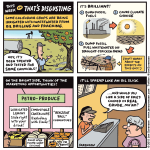The Sorensen Monologues
Archive for August 17th, 2015
This week in That’s Disgusting: Oil Wastewater Irrigation
According to this Mother Jones article, the drought in California is leading to increasing amounts of oil wastewater being applied to crops. While I understand and support programs like Bill Gates’ effort to extract potable H20 from sewage water as a means of preventing disease in poor countries, this would not be quite the same. Benzene, a known carcinogen, is showing up in concentrations higher than is allowed for drinking water. As an official comfortingly reassures us in the MoJo article:
“I admit that [some oilfield contaminants] are in there,” says David Ansolabehere, the General Manager of the Cawelo Water District, “but they are at such a low level I wouldn’t think they are doing any harm. But we are looking into that to make sure there isn’t any harm being done.”
The trouble is, testing methods are badly outdated — only recently have officials begun testing for a wider range of industrial chemicals — and fracking chemicals tend to be trade secrets. Energy companies have a long history of claiming their chemical recipes are proprietary information. So how do scientists know what to test for?
I’ll take slightly more expensive clementines than ones laced with unknown industrial effluvia, thanks.
More info on Think Progress.

